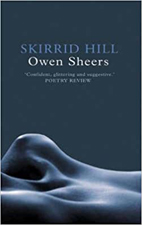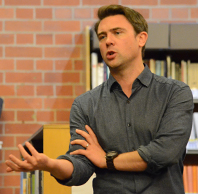Time and Change in Skirrid Hill
 It is quite appropriate that Sheers opens his collection Skirrid Hill with the poem ‘Mametz Wood’. It is a poem about time, change, memory and conflict and these concerns reverberate throughout the book. While ‘Mametz Wood’ is the first poem listed on the Contents page, there is the prologue poem, ‘Last Act’, whose title also betrays an interest in time. It is a poem which is of the present, but which looks backward – it is the ‘last’ act, the completion of a task – and forward – it prefaces the collection to come.
It is quite appropriate that Sheers opens his collection Skirrid Hill with the poem ‘Mametz Wood’. It is a poem about time, change, memory and conflict and these concerns reverberate throughout the book. While ‘Mametz Wood’ is the first poem listed on the Contents page, there is the prologue poem, ‘Last Act’, whose title also betrays an interest in time. It is a poem which is of the present, but which looks backward – it is the ‘last’ act, the completion of a task – and forward – it prefaces the collection to come.
The Pains of History
There is a disparity in ‘Mametz Wood’ between the gentle, lilting reflectiveness of the tercets – a popular form for Sheers, featuring in 20 of Skirrid Hill’s poems – and the brutality of the historical event which is unearthed by the ‘plough blades’. While the bone fragments have become part of the landscape, naturalised so that they resemble ‘flint’ or a ‘broken bird’s egg’, Sheers reminds us that these are pieces of ‘skull’, finger’ and ‘shoulder-blade’ of the ‘wasted youth’ of the Battle of the Somme in World War I. The past keeps re-emerging into the present – Sheers uses the striking simile ‘like a wound working a foreign body to the surface of the skin’ to describe the earth’s continued revelation of the bones. The image suggests both pain and cleansing.
Loosening Family Ties

That interplay between past and present is also apparent in ‘Trees’, a poem which also looks to the future. The planting of trees is an investment in the future, no tree more so than an oak, a tree which takes decades to mature and can live for hundreds of years. The speaker’s father has planted trees to celebrate the arrival of his children and now plants an oak ‘in the middle of the top field’, which he admits with understatement will take ‘some time’ to grow. As Sheers says, the sapling is ‘loaded with the promise of what it will become’, creating an image of a fulfilling future, but the end of the poem is ambiguous. The red sun might be reflecting that promise in the ‘rising’ of the day, but equally it could be the ‘setting’ sun, often a metaphor for death. The joy of planting in the poem is inhabited by the melancholy of the realisation that the planter is unlikely to see the mature tree.
The role of time in family relationships is also a concern of ‘Farther’ and ‘On Going’. The pun in the title of ‘Farther’ suggests that distance has grown between the speaker and his father, the inevitable result of growing up and independence. However, the fact that they climb Skirrid Hill ‘again’ indicates a re-enactment of an old habit, and their choice of ‘the long way round’ suggests that there is mutual enjoyment in the re-forging of the old bond. The idea is continued metaphorically in the stages of their walk, as the separated son turns ‘Half way up’ to look back at his now elderly father’s ‘bent head’, breathing ‘short and sharp and solitary’. But shortly afterwards the lexis changes: ‘you are with me again’ and they ascend to the summit ‘together’. The careful positioning of the camera for the self-timer photograph is a reflection of the poem itself – an attempt to capture and frame a significant moment. The poem ends with a paradox which pulls together the unavoidable separation between a father and his adult son, and the son’s own ageing – ‘with every step apart, I’m another closer to you.’
‘On Going’, a gentle tender poem, also has age at its centre, but also death, indicated by the in memoriam dedication. In a direct statement of the extreme vulnerability of the dying woman, Sheers uses the oxymoronic metaphor ‘an ancient child’. Although she is ‘fragile’, emphasised by the ‘paper temple’ metaphor, her struggling breath is ‘like a blustery wind’. This is a person at the very end of their time, where the medical paraphernalia of measuring devices, ‘instruments…/ to measure, record and monitor’, has become useless. Instead of data, the speaker needs a record of love, the exchange of a ‘flicker’ of the eyes for a ‘kiss’, something that machinery can never measure. And with that the speaker can accept death, suggested by the sibilance of the final lines and the spondee on the lengthened syllables of ‘slow-closing’ before the final, fading unstressed syllable.
An Unchanging Landscape

Though it starts in the fields of France, Sheers’ collection is named after Skirrid Fawr, a mountain on the eastern edge of the Brecon Beacons in Wales. Many of the poems are specifically placed within the Welsh landscape. Human life is in constant flux and human beings come and go, but the land endures. In the parallel poems ‘Y Gaer’ and ‘The Hill Fort’, these points are made. Even the change of language of the titles is a mark of human change, the Welsh being replaced by English, though the place itself remains the same. In the first poem, the human-built ‘trench and rampart’, words connoting defensive strength and permanence, are now only ‘mossy gums’, decayed and toothless. In the second poem, the father guides his son,
‘pointing out all the places lived in
by the fathers and sons before them:
Tretower, Raglan, Bredwardine…’
The fathers and sons have gone, ‘no more than scattered grains’, but as he points out, the landscape will be the same in ‘9, 19 or 90 years’. The poems are about personal loss and untimely death, making the contrast all the more poignant.
The relationship between land and time is central to the poem ‘History’, where academic study of the subject in the ‘pages’ of books is rejected in favour of a visit to the ‘disused quarry’. The quarry is an old slate working – another sign of ephemeral human activity – and Sheers uses the qualities of slate, which can be separated into thin wafers of stone, as a truer history book. Speaking in the second person to the reader, he makes the poem almost tactile, instructing us to use our ‘fingertips’ to separate the ‘leaves’ and ‘gently/ prise it apart.’ The language and actions are delicate, precise, and we end with
‘a book of slate
in which you can read
a story of stone – ’
It is a history of the land, of the valley, and, inevitably, of every human being who has lived there. The poem suggests that transient human beings are still a part of the landscape on which they live, just as the First World War soldiers’ bones have remained literally part of the landscape in northern France.
Further Reading
Blogpost on Sheers’ play Pink Mist